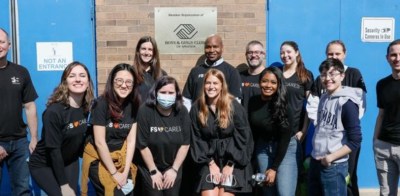About this episode
What is the perception of financial services? And how can we nurture talent that hasn’t always seen a place for themselves in the industry?
In this episode, we’re joined by Carlos Muñoz, Head of Asset Manager DEI Engagement at Morgan Stanley. He heads The Morgan Stanley Equity Collective, an industry leading group of top firms (including FS Investments) that work together to educate, empower and develop the next generation of diverse leaders in financial services.
Carlos sits down with FS Investments’ Director of Client Value Add Programs Ginevra Czech and Head of Platform Strategy & Senior Relationship Manager Laurie Durante to discuss the ways we’re giving back to our communities and making our industry a more equitable place.
Learn more at www.fsthrive.com.
Transcript excerpt
Carlos Muñoz:
For us, the opportunity really is to help demystify the industry, create awareness, create education—and then more importantly—provide tools and resources for these students to go on a career journey into financial services.
Ginevra Czech (00:18):
Welcome back to FS Thrive, the podcast by FS Investments. I am very excited to be here today. I’m your host, Ginevra Czech, the director of Client Value Add programs, and we are joined by Laurie Durante, our Head of Platform Strategy and Senior Relationship Manager, and Carlos Muñoz, who is the Head of Asset Manager Diversity, Equity, and Inclusion Engagement over at Morgan Stanley. So I’m really excited to have both of you join us today. And I think, Laurie, I want to start with you just to explain why the three of us are sitting down together. What’s the relationship between everyone in the room?
Laurie Durante (00:53):
Yes. So as Ginevra mentioned, I’m Laurie Durante. I am the Senior Relationship Manager, but I cover Morgan Stanley specifically. So, we are so excited to be joined here by Carlos today. We have been participating in the Morgan Stanley Equity Collective for just about two years now, which has been a really exciting initiative that Carlos is going to tell us much about today. So, we’re excited, but our relationship with Morgan Stanley really spans across our entire organization, starting from the top with our CEO Michael Forman going down to our co-presidents, Enrico [Gaglioti] and Mike Kelly and our Head of National Accounts, Kirsten Pickens. So, we have a lot of deep ties within Morgan Stanley and we’re so excited to talk more about the Equity Collective today.
Ginevra Czech (01:36):
Awesome. So yeah, let’s jump right in. Carlos, what is the Equity Collective?
Carlos Muñoz (01:41):
Well, first I want to say thank you for having me. This is a great opportunity to connect and really talk about our great relationship and collaboration thus far on the Equity Collective. So, the Equity Collective is an initiative that was started by Morgan Stanley almost coming up on three years at this point. It started as a result of a series of diversity, equity and inclusion meetings that we hosted with about 15 to 20 asset managers to talk about our respective D&I efforts, what we’re doing within our four walls, using each other as a soundboard, sharing ideas, hearing from thought leaders, and it was a fantastic meeting. Andy Saperstein, who is the co-president and Head of Wealth Management, came back to our group and said, “This is a fantastic meeting, love that you’re hosting this meeting. I get really good feedback from my counterparts; however, we need to do more and we need to be intentional.” And so, as a result, the Equity Collective was born. So, I was tasked with the opportunity of leading the effort. So, I got together a handful of asset managers to really form an advisory council to focus on four pillars. One, what’s the branding and perception of financial services? Number two, how do we engage high school students? How do we engage college students? And more importantly, how do we cultivate existing talent within the industry? So, to no surprise, in terms of the branding and perception of the industry, what we realized is that students—and I’m sure you experience this all the time—people don’t know what financial services really is. So, individuals think of financial services as financial advisors, investment bankers, traders, portfolio managers, but really they miss out on a lot of the other opportunities. And then more importantly, individuals feel like they don’t have the right background. So, if they don’t have an economics major or a finance major or an MBA, they, in a sense, preclude themselves from the industry. But then more importantly, when it comes to diverse talent, individuals feel like they don’t have a place at the table, and that’s where we come in. We want to make sure that these individuals understand that there are opportunities for them within the industry, well beyond the core responsibilities that they’re accustomed to seeing day in, day out. So, for us, the opportunity really is to help demystify the industry, create awareness, create education, and then more importantly, provide tools and resources for these students to go on a career journey into financial services.



